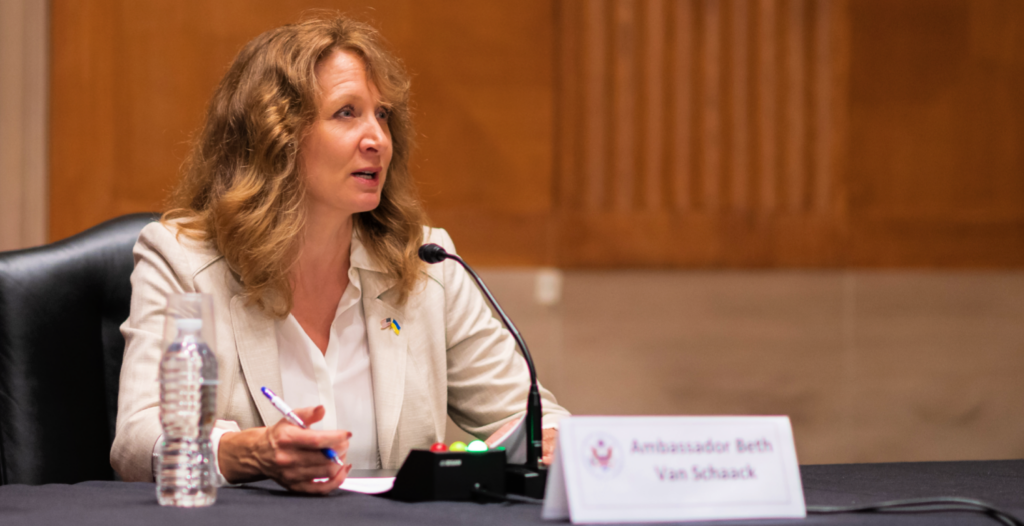This hearing of the Commission on Security and Cooperation in Europe was held to discuss the renewed military action taken against Chechnya in response to terrorist bombings. There is extensive discussion on the ramification of Russian human rights violations for the state of Russian Democracy. Additionally, there are several arguments that the war could destabilize the Caucus region.
Members
Hon. Christopher Smith
Chairman
Commission on Security and Cooperation in Europe
Hon. Ben Nighthouse Campbell
Co-Chairman
Commission on Security and Cooperation in Europe
Hon. Steny Hoyer
Commissioner
Commission on Security and Cooperation in Europe
Hon. Frank Wolf
Commissioner
Commission on Security and Cooperation in Europe
Hon. Benjamin Cardin
Commissioner
Commission on Security and Cooperation in Europe
Hon. Joseph Pitts
Commissioner
Commission on Security and Cooperation in Europe
Witnesses
Dr. John Dunlop
Senior Fellow
Hoover Institue
Dr. Fiona Hill
Director of Strategic Planning
Eurasia Foundation
Cyoma Usmanov
Representative
Chechen Republic to the United States
Yo'Av Karny
Journalist
Relevant Countries

Hamas’ Hostages, Putin’s Prisoners, and Freeing Inte...
Oct 25, 2023The practice of seizing hostages and political prisoners, as well as actively terrorizing civilians is a constant displayed by Hamas in Israel and Russia’s war against Ukraine. To highlight issues […]
HEARING: RESCUING UKRAINIAN CHILDREN AND WOMEN FROM ...
Jul 19, 2023Wednesday, July 26, 2023 10:00 a.m. to 11:30 a.m. Rayburn House Building room 2200 Streaming here: https://www.youtube.com/watch?v=_n-NyI5xjt8 Russia’s war has exposed the critical need for U.S. and international action to […]

Protecting Ukrainian Refugees from Human Trafficking
Apr 07, 2023More than 4 million refugees have fled Ukraine since Russia’s massive invasion on February 24, in the largest migration of people in Europe since the Second World War. Given Ukraine’s […]
Helsinki Commission Deeply Concerned Over Latest Ele...
Jul 27, 2022WASHINGTON—Helsinki Commission Chairman Sen. Ben Cardin (MD) and Co-Chairman Rep. Steve Cohen (TN-09) today expressed deep concern about an effort by the international community’s High Representative in Bosnia to impose […]

Behind Enemy Lines
Jul 20, 2022As Russia’s genocidal war against Ukraine continues, Ukrainians in occupied territories are demonstrating courageous resistance in the face of atrocities, deprivation, and forced displacement, the scope and scale of which […]
Helsinki Commission Hearing to Highlight Life in Ukr...
Jul 15, 2022WASHINGTON—The Commission on Security and Cooperation in Europe, also known as the Helsinki Commission, today announced the following hearing: BEHIND ENEMY LINES Life in Ukraine’s Newly Occupied Territories Wednesday, July […]
Supporting Ukrainian Refugees
May 25, 2022More than 6 million Ukrainians have had to flee their country due to Russia’s brutal war of aggression. Most have entered bordering EU states, with more than half of those […]
Support for Ukrainian Refugees to Be Discussed at He...
May 20, 2022WASHINGTON—The Commission on Security and Cooperation in Europe, also known as the Helsinki Commission, today announced the following hearing: SUPPORTING UKRAINIAN REFUGEES U.S. Policy and Visa Issuance Wednesday, May 25, […]
Russia’s Swiss Enablers
May 05, 2022Long known as a destination for war criminals and kleptocrats to stash their plunder, Switzerland is a leading enabler of Russian dictator Vladimir Putin and his cronies. After looting Russia, […]

Russian War Crimes in Ukraine
May 04, 2022Well-documented Russian bombings and missile strikes in Ukraine have decimated hospitals, schools, and apartment buildings, including a theater in Mariupol where hundreds of children were sheltering and the Kramatorsk rail […]


